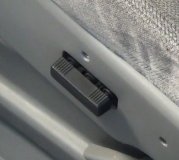Besides things that cause noise, some things are done to prevent noise from radiating in. Most notably, the antenna cable has a braided metal shield around the main wire. That still leaves the antenna itself susceptible to picking up interference. GM started building the antenna into the rear window on some cars. That reduced the noise from the engine but they picked up the arcing from the fuel pump motor. That will sound like a sharp crackling noise. Spark plugs and wires sound like very rapid popping, and generators usually make a high-pitched whine that increases in pitch as the engine speeds up. Since the '87 model year, GM generators have been real well known for causing huge voltage spikes that can damage the diodes and voltage regulator inside the generator. To determine if this is the source of the noise, unplug the small connector on the rear, side of the generator. If the noise is gone when the engine is running, try replacing the battery. As they age, they lose their ability to dampen and absorb those spikes. Replacing the battery at the same time a defective generator is replaced will reduce the number of very common repeat failures.
For those cars that have the antenna mounted to the fender, wiggle the base when the noise is occurring. If the noise changes or goes away, tighten the nut that holds the base or check it for rust.
Some noise can't be prevented. A common source is driving under power lines or near factories that use large electric motors. The high current sets up a magnetic field around the wires that radiates a 60 cycle hum into the radio. That is a real low tone and the cause will be obvious because it will decrease as you drive away from the source. That rarely lasts more than a few hundred yards.
SPONSORED LINKS
Was this helpful?
Yes
No
-2
Monday, October 22nd, 2018 AT 2:37 PM
(Merged)



